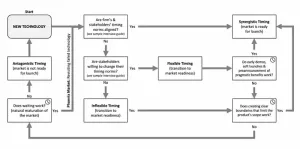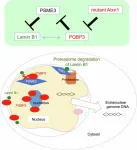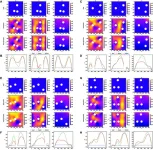(Press-News.org) The University of Ottawa has been awarded a $1 million grant from the Ontario Research Fund – Research Excellence (ORF-RE) to support the “Secure, Intelligent and Trustworthy Ecosystems for Connected and Autonomous Vehicles” (SITE-CAV) project.
Led by Burak Kantarci,Full Professor, School of Electrical Engineering and Computer Science, uOttawa’s Faculty of Engineering, the project aims to accelerate the development and integration of connected and autonomous vehicles (CAVs – or vehicles equipped with sensors and decision-making software that drives and controls it without direct human intervention) into Ontario’s transportation ecosystem.
This investment will enable the creation of a collaborative team of researchers from the University of Ottawa, Western University (Professors Abdallah Shami and Xianbin Wang), and the University of Toronto (Professor Birsen Donmez), in partnership with industry leaders, to develop groundbreaking solutions for the challenges posed by CAV technology.
“This funding represents a significant milestone for our research team and highlights the importance of our work,” explained Professor Kantarci. “We are committed to driving meaningful advancements in technology that will benefit not only our students and academic community but also society at large.”
The project will involve a collaboration with leading industry partners and will ensure that the research conducted is aligned with industry needs that can translate into practical applications.
SITE-CAV will also contribute to Ontario's emerging CAV sector by training some 59 highly qualified personnel over four years, including undergraduate and graduate students, as well as postdoctoral researchers.
“Our work will not only advance technological research and development but also contribute to safer, more secure, and efficient transportation systems, ultimately enhancing public safety and supporting the adoption of autonomous vehicle technologies,” concluded Professor Kantarci.
The SITE-CAV project is set to commence in January 2025 at uOttawa’s Kanata-North campus at its Smart Connected Vehicles Innovation Centre, which includes its own private test-driving track.
END
New provincial funding to help drive connected and autonomous vehicle research at uOttawa
New provincial funding to help drive connected and autonomous vehicle research at uOttawa
2024-09-03
ELSE PRESS RELEASES FROM THIS DATE:
Department of Energy selects Argonne to lead national energy storage hub
2024-09-03
Today the U.S. Department of Energy (DOE) announced the creation of two new Energy Innovation Hubs. One of the national hubs, the Energy Storage Research Alliance (ESRA), is led by DOE’s Argonne National Laboratory and co-led by DOE’s Lawrence Berkeley National Laboratory (Berkeley Lab) and Pacific Northwest National Laboratory (PNNL).
ESRA (pronounced ez-ruh) brings together nearly 50 world-class researchers from three national laboratories and 12 universities to provide the scientific ...
People eating beef are less likely to live near the industry’s pollution, Pitt researchers found
2024-09-03
Anyone who’s researched ways to lower their environmental impact has likely heard they should eat less meat, particularly beef. Even at scale, cows are an inefficient way to feed people — it takes nearly four tons of water to recoup one ton of beef, and many farming practices emit greenhouse gasses and pollutants.
University of Pittsburgh researchers are the first to trace one of those pollutants, nitrogen, along the U.S. beef supply chain at the county level. They found high spatial disconnect between where ...
Can technology turn exercise pain into pleasure?
2024-09-03
Virtual reality (VR) video games that combine screen time with exercise are a great way to get fit, but game designers face a major challenge – like with regular exercise, adherence to ‘exergames’ is low, with most users dropping out once they start to feel uncomfortable or bored.
Computer scientists at the University of Bath believe they’ve found a solution: create exergames that use sensors to continuously measure a person’s emotional state while they exercise, then tweak the game – for instance, making ...
When is the right time to launch new technologies?
2024-09-03
New research from Bayes Business School (formerly Cass) finds that being on the cutting edge of technology is not enough to ensure success in the market, and managers must strategically time launches to create a source of opportunity and credibility for the firm.
The study, led by Dr Thomas Robinson, Senior Lecturer in Marketing at Bayes, with Dr Ela Veresiu, Associate Professor of Marketing at Schulich School of Business, York University, Toronto, develops a framework for guiding organisations on the best situations for a product launch.
The research identifies four timing situations that can confront marketing managers. Knowing ...
Mayo researchers develop tool that measures health of a person’s gut microbiome
2024-09-03
ROCHESTER, Minn. — A team of Mayo Clinic researchers has developed an innovative computational tool that analyzes the gut microbiome, a complex ecosystem of trillions of bacteria, fungi, viruses and other microorganisms within the digestive system, to provide insights into overall well-being.
In a new study published in Nature Communications, the tool demonstrated at least 80% accuracy in differentiating healthy individuals from those with any disease. The tool was developed by analyzing ...
Unveiling the molecular mechanisms linking aging with neurodegenerative diseases
2024-09-03
Tokyo Medical and Dental University (TMDU) researchers elucidate the role of PQBP3 in stabilizing the nuclear membrane and its relationship to senescence and neurodegeneration
Tokyo, Japan – Aging is the prime cause of neurodegenerative diseases, such as Alzheimer’s disease, Parkinson's disease, and amyotrophic lateral sclerosis. But what exactly increases the prevalence of these brain disorders as one grows older? The molecular forces linking aging, cellular senescence, and the onset of these neurodegenerative conditions ...
Keep devices out of bed for better sleep – Otago study
2024-09-03
Despite what we’ve been led to believe, the timing of evening screen use, rather than the activity itself, negatively impacts youth sleep, a University of Otago study has found.
Current sleep guidelines recommend no screen use in the hour or two before bed. However, the researchers found screen time in the two hours before bed had little impact on youth sleep, it was screen time once in bed that caused problems.
Lead author Dr Bradley Brosnan, of the Edgar Diabetes and Obesity Research Centre, says screen time is a mainstay in adolescents’ bedtime routines, and sleep guidelines need to be revaluated to better reflect modern life.
Published in JAMA Pediatrics, ...
Dr. Torabi to study vulnerabilities in electric vehicle charging management systems
2024-09-03
Dr. Sadegh Torabi, Assistant Professor, Information Sciences and Technology, College of Engineering and Computing (CEC), and Research Fellow at the Center for Secure Information Systems (CSIS), is set to receive funding for the project: “Collaborative Research: CISE MSI: RPEP: OAC: Macroscopic and Microscopic Inference and Analysis of Vulnerabilities within EV Charging-Management Systems.”
Via this project, Dr. Torabi and his partners will establish a collaborative ecosystem among academia, industry, and the public sector to bolster the resilience of the EV Charging Infrastructure (CI). The critical nature of EV CI has made them targets for malicious attacks, often state-sponsored, ...
Think simpler, flow faster
2024-09-03
Analyzing and simulating fluid flow is a challenging mathematical problem that impacts various scenarios, including video game engines, ocean current modeling and hurricane forecasting. The core of this challenge lies in solving the Navier–Stokes equations, a set of classical equations that describe fluid dynamics. Recently, deep learning has emerged as a powerful tool to accelerate equation solving. Using this technique, a team designed a novel approach that can provide accurate solutions 1,000 times faster than traditional equation solvers. The team’s study was published June 26 in Intelligent ...
Eating fish but not omega-3 supplements during pregnancy associated with lower likelihood of autism diagnosis, NIH-funded study finds
2024-09-03
Eating any amount of fish during pregnancy was associated with about a 20% lower likelihood of autism spectrum disorder (ASD) diagnosis, particularly in females, and a slight reduction in autism-related traits in offspring, according to a new study funded by the Environmental influences on Child Health Outcomes (ECHO) Program at the National Institutes of Health.
However, researchers did not find the same association with supplements containing omega-3 fatty acids.
Fish is an important source of omega-3 fatty acids, an essential nutrient during pregnancy for supporting maternal health and child neurodevelopment. A recent analysis of ECHO Cohort data revealed that about ...
LAST 30 PRESS RELEASES:
Nonprofit leader Diane Dodge to receive 2026 Penn Nursing Renfield Foundation Award for Global Women’s Health
Maternal smoking during pregnancy may be linked to higher blood pressure in children, NIH study finds
New Lund model aims to shorten the path to life-saving cell and gene therapies
Researchers create ultra-stretchable, liquid-repellent materials via laser ablation
Combining AI with OCT shows potential for detecting lipid-rich plaques in coronary arteries
SeaCast revolutionizes Mediterranean Sea forecasting with AI-powered speed and accuracy
JMIR Publications’ JMIR Bioinformatics and Biotechnology invites submissions on Bridging Data, AI, and Innovation to Transform Health
Honey bees navigate more precisely than previously thought
Air pollution may directly contribute to Alzheimer’s disease
Study finds early imaging after pediatric UTIs may do more harm than good
UC San Diego Health joins national research for maternal-fetal care
New biomarker predicts chemotherapy response in triple-negative breast cancer
Treatment algorithms featured in Brain Trauma Foundation’s update of guidelines for care of patients with penetrating traumatic brain injury
Over 40% of musicians experience tinnitus; hearing loss and hyperacusis also significantly elevated
Artificial intelligence predicts colorectal cancer risk in ulcerative colitis patients
Mayo Clinic installs first magnetic nanoparticle hyperthermia system for cancer research in the US
Calibr-Skaggs and Kainomyx launch collaboration to pioneer novel malaria treatments
JAX-NYSCF Collaborative and GSK announce collaboration to advance translational models for neurodegenerative disease research
Classifying pediatric brain tumors by liquid biopsy using artificial intelligence
Insilico Medicine initiates AI driven collaboration with leading global cancer center to identify novel targets for gastroesophageal cancers
Immunotherapy plus chemotherapy before surgery shows promise for pancreatic cancer
A “smart fluid” you can reconfigure with temperature
New research suggests myopia is driven by how we use our eyes indoors
Scientists develop first-of-its-kind antibody to block Epstein Barr virus
With the right prompts, AI chatbots analyze big data accurately
Leisure-time physical activity and cancer mortality among cancer survivors
Chronic kidney disease severity and risk of cognitive impairment
Research highlights from the first Multidisciplinary Radiopharmaceutical Therapy Symposium
New guidelines from NCCN detail fundamental differences in cancer in children compared to adults
Four NYU faculty win Sloan Foundation research fellowships
[Press-News.org] New provincial funding to help drive connected and autonomous vehicle research at uOttawaNew provincial funding to help drive connected and autonomous vehicle research at uOttawa





